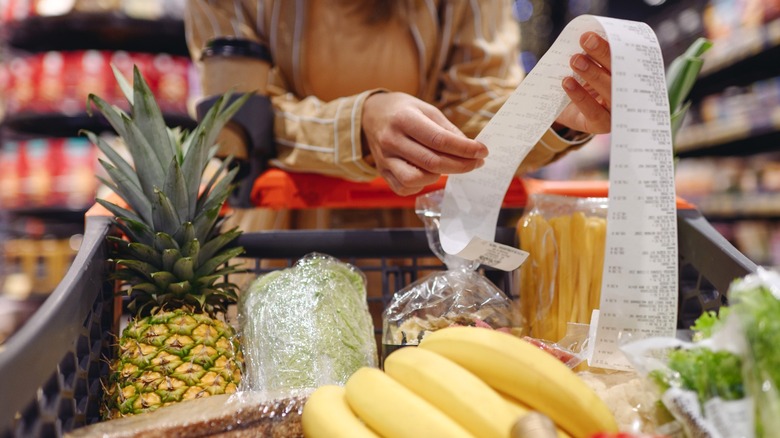Do You Have To Pay Sales Tax At The Grocery Store?
Many folks these days are doing anything they can to save a few bucks when grocery shopping. Seeking out the most lucrative sales and clipping coupons helps when attempting to save some coin, but some costs are out of our control. In certain areas, looking for ways to save at the supermarket is even more important because your total bill gets inflated at the end of the sale by an often-overlooked entity — the state you reside in.
Most states in the U.S. have a sales tax on retail goods. This tax is meant to cover the costs of services a state provides within its borders. In some commonwealths, this fee is applied to all commodities, including groceries. As a result, when you find a deal on the best frozen pizza brands in these areas, you don't save as much as you would in neighboring regions. All in all, there are 10 states that tax groceries. If you reside in Alabama, Arkansas, Hawaii, Idaho, Illinois, Mississippi, Missouri, South Dakota, Tennessee, or Utah, you pay a little more before leaving the checkout stand. Residents in Oklahoma saw the grocery sales tax removed in 2024, but it remains to be seen if local jurisdictions will raise rates in lieu of a state tax.
A few of these areas offer discounts in the form of refunds and credits for specific demographics. Others take a different approach and allow local jurisdictions to apply another fee on top of the state's rate. However, some regions not only don't tax items from the grocery store — they have no sales tax at all.
Grocery shopping might be cheaper in some states
The states of Alaska, Delaware, Montana, New Hampshire, and Oregon have no sales tax whatsoever. Some, like New Hampshire, do charge for prepared meals and other services, but the supermarket is off-limits. If you are shopping in Montana and find milk at the back of the grocery store for $2.99, that's exactly what you will pay as you check out.
Some states exempt groceries but not all food from sales tax. In California, there is no additional fee for groceries, but certain prepared meals are taxed. In Colorado, grocery bills are free from the sales tax applied to purchased goods — with the exception of carbonated water, candy, and cold sandwiches, among other items. You can pick out the best avocados from the grocery store in Michigan without worrying about them being taxed, but if you are buying canned beverages, cookies, or potato chips, expect to pay a little more.
Still, just because a state doesn't apply a tax on retail goods doesn't necessarily mean those goods will be more affordable. Alaska doesn't charge its residents when they purchase food or other commodities. However, because of Alaska's distant location from the rest of the country, those goods often come at a higher cost due to shipping fees. You might not have to pay the state any extra on your grocery bill, but folks along the supply chain — from farmers to truck drivers — have to make ends meet like anybody else.

